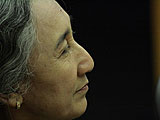The Xinjiang Blame Game
By Bernt Berger for ISN
In the aftermath of the worst ethnic violence in decades in China’s Xinjiang region, Uighur World Congress (UWC) President Rabiya Kadeer is rallying for the Uighur cause in Japan and Australia, while Beijing is working hard to portray recent outbreaks of violence as a human tragedy instigated by separatists abroad.
During a visit to Tokyo this week, Kadeer claimed that nearly 10,000 Uighurs involved in deadly 5 July riots in Xinjiang - in which Uighurs attacked Han Chinese, police attempted to break up protests after fatal attacks on Uighur factory workers, and Han Chinese launched revenge attacks - went missing in one night, and that an international investigation should be launched. Beijing has condemned Kadeer’s visit to Tokyo, summoning the Japanese ambassador to demand that the Japanese government take effective action “to stop her anti-China, splittist activities in Japan.”
But under the surface of the blame game lie some difficult truths. First, both Beijing and the Uighur leaders in exile can have only a limited impact on the situation, which has shifted center-periphery to inter-ethnic tensions on a civilian level. Second, major shortcomings and infighting within the Chinese party system have contributed to the present situation. Third, and very importantly, the Uighurs know that it is in their interests to ensure that this conflict be kept at bay.
The fatal confrontations between Uighur and Han Chinese civilians indicate a trend toward an unprecedented level of civilian inter-ethnic strife. Ironically, the central government has become not only a party to the conflict, but also a guarantor of stability. The conflict will remain at a low intensity level as long as the People’s Armed Police (PAP) maintains a strong presence in the region. The lacking availability of small arms might have averted an all-out civil conflict; however, strong infiltration of Uighur communities by the State Security apparatus failed to prevent the mobilization of recent events.
For Beijing, the decision to play down the inter-ethnic strife element has several motives. Besides maintaining its sway in the conflict, the status quo of CCP supremacy overrides concerns about inter-ethnic harmony.
The centralized command structure of the PAP under the Central Military Commission (CMC) has helped to avoid misuse of paramilitary forces on a local level. Notwithstanding, it has caused inertia in decision-making, leaving Vice-President Xi Jinping - in charge of internal stability matters but not a member of the CMC - without the power to initiate a strong response. Only after President Hu Jintao had left the G8 summit in Italy and resumed authority did the police take strong action. But by this time, the Chinese public already felt insufficiently protected and took to the streets in retaliation.
Yet, Hu’s abrupt departure from the G8 summit also indicates an inner party dispute over how to proceed. Party secretary and strongman in Xinjiang, Wan Lequan, has earned himself a reputation for towing a hard line on minority issues. Hu had nominated Wang for his post and both are political allies. Any setback in Xinjiang would have implications for Hu’s position. While Wan initially tried to downplay major unrest in the province, Hu needed to maintain politburo unity in Beijing.
For the Uighur lobby abroad, the situation looks similarly bleak, as demands for greater autonomy lose strength; especially in view of the regional ethnic mix of nearly 50 minorities, the claim for political leadership is limited.
Ironically, it is in the Uighur lobbyists’ interest that the central government keeps a civilian conflict at bay. Any spread of inter-ethnic strife would be a setback for their cause and render negotiations impossible. Firstly, the central government would lack the legitimacy for such a rapprochement among the Han majority in China. Secondly, in order to sit at the negotiation table, the UWC would have to admit that it is a conflict party. This would be setback for its newly gained international standing and popularity.
Thus, the UWC has tried to ignore the fact of civilian violence and limited its critique to police actions during the course of events. In the long term, upholding the center-periphery status quo is the only way to bring the real issues of disparities in political representation and economic distribution back on the table.
So far, both parties have failed to address the causes of the recent outbreaks of violence or to find a viable solution to avoiding inter-ethnic tensions. This would only be possible by engaging in pragmatically focused talks, avoiding the blame game and trying to calm sentiments on the ground.

